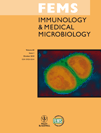Macrophage responses to CF pathogens: JNK MAP kinase signaling by Burkholderia cepacia complex lipopolysaccharide
Present address: Suzanne McKeon, Department of Microbiology and Infectious Diseases, University of Calgary Health Sciences Centre, AB, Canada.
Editor: Nicholas Carbonetti
Abstract
Chronic bacterial colonization of the airways with opportunistic pathogens is the primary cause of morbidity and mortality in cystic fibrosis (CF) patients. Burkholderia cepacia complex (Bcc) organisms pose a particular challenge in CF lung disease, due in part to their ability to trigger a fulminant pneumonia. This study compares the U937 macrophage response to two Bcc species, B. cenocepacia and Burkholderia multivorans, against Pseudomonas aeruginosa and Staphylococcus aureus. The two Bcc strains demonstrated higher levels of U937 macrophage internalization compared with both P. aeruginosa and S. aureus. Both the Bcc strains also stimulated significantly greater levels of tumor necrosis factor-α and interleukin-1β from macrophages when compared with P. aeruginosa. Further examination of the macrophage response to B. multivorans demonstrated that the lipopolysaccharide component of these bacteria was a potent inducer of proinflammatory cytokines and was shown to signal predominantly through the c-Jun N-terminal kinase mitogen-activated protein kinase pathway. These studies further characterize the host response to Bcc and in particular B. multivorans, now the predominant Bcc species in many CF populations.




